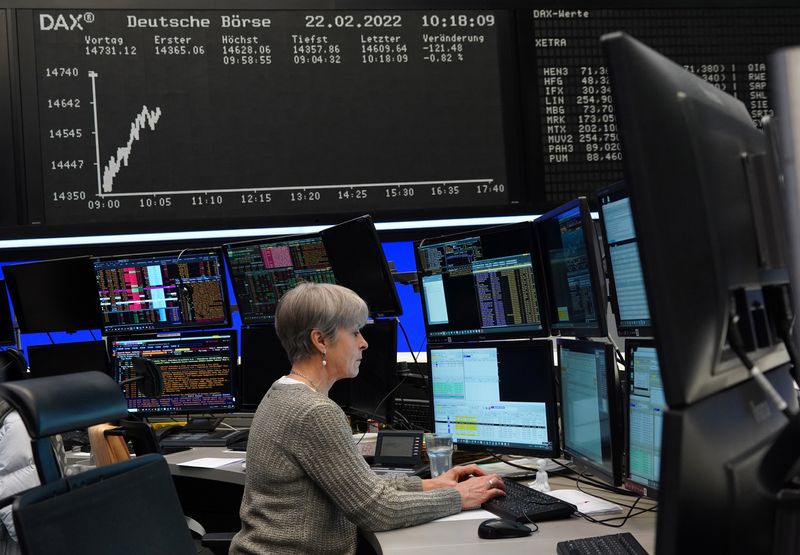
© Reuters. FILE PHOTO: A trader works at the Frankfurt stock exchange in Frankfurt, Germany, February 22, 2022. REUTERS/Timm Reichert
By Wayne Cole
(Reuters) – A look at the day ahead in European and global markets from Wayne Cole.
It’s been a subdued start to a busy week studded with tech earnings and major data from both sides of the Atlantic.
Microsoft (NASDAQ:), Meta, Amazon (NASDAQ:), Google (NASDAQ:) and Intel (NASDAQ:) all report this week. Just five tech stocks have accounted for two-thirds of the ‘s gains this year, so a lot is riding on the outcome.
Analysts at Wedbush Securities are tipping upside surprises from the tech majors, with an accent on cost cutting and job shedding across the industry.
“We also believe a major narrative of tech earnings season will be the AI arms race and each Big Tech player updating investors on their own AI ambitions/monetization strategy as Redmond battles Google and other tech stalwarts for the AI trophy case,” they write.
Data includes the first reading on U.S. GDP which is forecast to slow to 2.0% for the March quarter, from 2.6%, though the Atlanta Fed’s trusty GDP Now tracker is picking 2.5%.
The employment cost index and core personal consumption expenditure measure of inflation will help refine expectations for next week’s Federal Reserve meeting. Futures price a quarter-point hike at 89%, suggesting the market would move more on a soft outcome in either figure.
The surprising strength in business surveys in Europe suggested EU GDP might also beat forecasts for 0.2% q/q growth in the first quarter.
An unwelcome omen for inflation was a rise in wheat prices after Russia threatened to terminate a grain deal allowing Ukrainian exports, raising concerns over world supplies.
Another risk bubbling away in the background is the U.S. debt ceiling with the House set to vote on the Republican plan to extend the debt limit in exchange for spending cuts.
Even if passed, it is highly unlikely to get past the Democratic-controlled Senate, and analysts are starting to get antsy the government will run out of money earlier than expected because of weak tax payments.
The cost of insuring exposure to U.S. sovereign debt rose to the highest level since 2011 last week.
Spreads on U.S. five-year credit default swaps widened to 51 basis points, more than double the level they stood at the start of the year.
One-year CDS have climbed to around 100 bps, well above the 82 bps seen during the 2011 U.S. sovereign debt downgrade.
BofA analyst Michael Gapen warns the risks of violating the debt ceiling are worse than in 2013 because the deficit is bigger as a percentage of GDP and the economy may already be in a recession.
He assumes the damage that can be inflicted by not raising the ceiling will most likely lead to a deal, but the risk is that it takes a selloff in equities and a widening of credit spreads before that happens.
Key developments that could influence markets on Monday:
– French central bank chief Francois Villeroy de Galhau speaks on the role of central banks in relation to climate change at finance event in London
– Dallas Fed manufacturing activity survey







